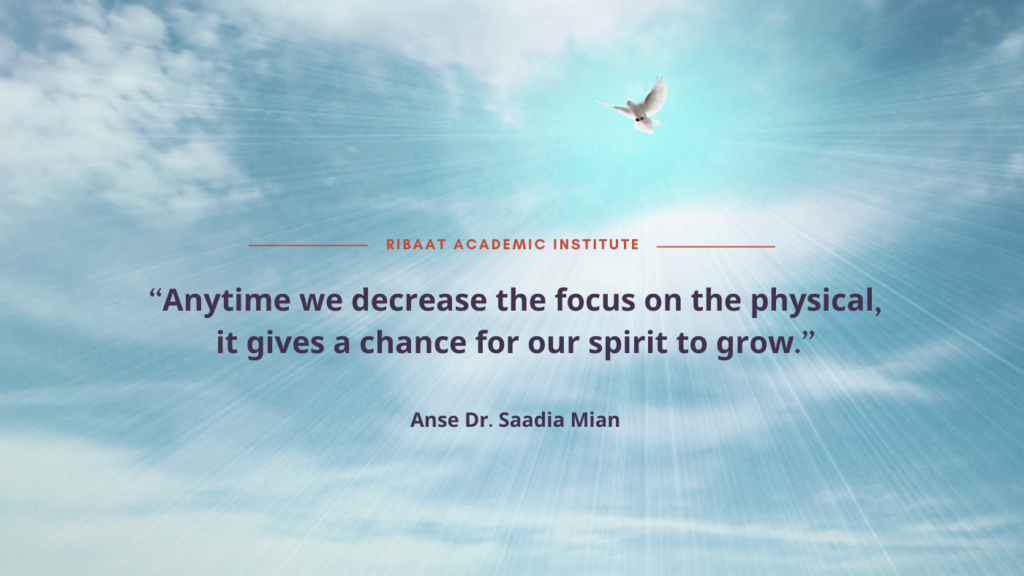Alhamdulillah for the blessing of witnessing another Ramadan. As we enter into Shawwal, we may be holding many different emotions at the same time: gratitude for seeing another Ramadan, sadness that it’s over along with the extra gatherings and sense of community, and maybe even some guilt at feeling happy that we can eat and drink during the day again.
While there are so many aspects of Ramadan that we hope to hold onto: the decreased need to be constantly eating, the sense of togetherness with the community, and the focus on recitation of the Quran; many look to their newfound relationship or revitalized connection with the Quran to be an area they hope to carry forth. For many, Ramadan is a time where they reconnect with the Quran after months of feeling disconnected and struggling to make it a priority.
That which might receive questioning eyes throughout the year becomes a commonplace practice in Ramadan. In fact, one of my favorite things about Ramadan is seeing the entire Ummah reciting the Quran on a daily basis. It is one of the only times in the year that one can be sitting reading the Quran at 2:30 pm and nobody will say anything! Because everyone is doing it. Everyone is rushing to complete their khatam of Quran (or read as much as they can) during the month.
So, after finding such a beautiful connection throughout the month, how do we keep this relationship with the Quran thriving after Ramadan?
1. Intention – Just like with any action in Islam, we start with a clear intention as is stated in the well-known hadith as narrated by ‘Umar bin Al-Khattab (may Allah be pleased with him) that the Messenger of Allah ﷺ said: “Actions are but by intentions, and each man will have but that which he intended.”
You can maximize this intention setting by remembering the following:
- It helps to be very specific about one’s intention and make it as personal as you can. For example, ‘I intend to strengthen my relationship with the Quran through daily recitation and contemplation so that its light illuminates my heart and draws in angels to envelope my home and family.’
- Be creative with your intentions and as a second step, write them down beautifully and place them in your favorite ibāda space.
2. Dua – Now that we have our intentions clear, these intentions become our dua. That’s why it’s helpful to spend some time attaining clarity about our intentions. Use your set intentions to call upon Allah. Pray for openings, pray for ease, pray for a heart that is always connected to the Quran.
3. Goal Setting – Now you can become specific about your goals. How much do you want to read before the next Ramadan? It could be a certain number of khatams, or it could be a certain number of pages. This goal should be attainable, but a little stretchy. See if you can do a little more than you did the year before.
4. Support – Find community and support each other. Everyone should have that special ‘Quran buddy’ (or buddies) that motivates you and you motivate. We were created to live in community and there is great joy in traversing the path of Quran together.
5. Joy & Love – Find joy in the journey. A hafidha (a female memorizer of the Quran) once said, ‘You will never be able to memorize the Quran unless you love it. So, find what makes you love it.’ This is different for everyone. Some people love the rhythm and flow of the recitation in tajwīd. Some love delving into the meanings with tafsīr. For others, especially those who have an ear for beautiful sounds, they enjoy listening to the Quran more than anything else. Still others find joy in creating beautiful art of their favorite ayat or Quran journaling. Maybe one or many of the above appeal to you, and it can be helpful to change things around at different times. The Prophet ﷺ said, “Allow the heart to rest at intervals,” reminding us of the natural tendency of humans to need rest and change to find greatest benefit.
6. Why? – Remember what it’s all about. Although it is gratifying when we set a goal and are able to achieve it, it is important to not lose sight of what our underlying objective is to maintain a relationship with the Quran. What’s your why? Ultimately, every one of our ‘why’s’ comes back to Allah ﷻ. We recite Quran because these are Allah’s ﷻ words and our goal is His pleasure and to connect our hearts to Him ﷻ. It is nice to recite more, but also, with sincerity, our hearts can remain connected to Allah ﷻ even if we do not complete as much as we would like to.
7. Purification & Elevation – Hold onto the gift of being cleansed spiritually and physically. During Ramadan, in a sense, we ‘starve the ego and feed the soul.’ Anytime we decrease the focus on the physical, it gives a chance for our spirit to grow. Physically, fasting decreases our cravings as our insulin levels stabilize throughout the day and it gives our cells a chance to detox and renew themselves. At the same time, we spend more time in activities that feed our souls. It becomes easier to do good deeds in this state. Just because Ramadan has ended, it doesn’t mean we can or should go back to exactly where we were beforehand. Every Ramadan can elevate our spirits more and more.
Every Ramadan comes and calls us to higher versions of ourselves. Every Ramadan, we push ourselves past expected norms to draw closer to our Creator. While maintaining the Ramadan atmosphere outside of the month can be a challenge, and in fact, is not even expected of us, we can still carry forth all the Good we found in the month. Let this be the year you allowed Ramadan to propel you toward a new relationship with the Quran and thereby with your Creator.
Anse Dr. Saadia Mian, Ribaat Instructor

